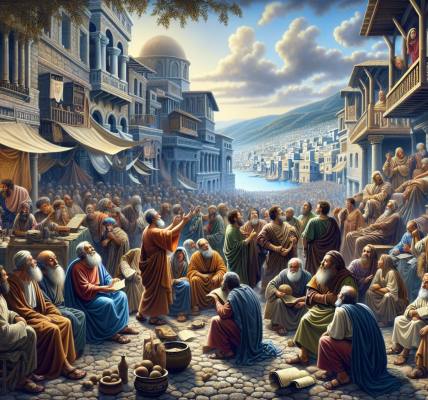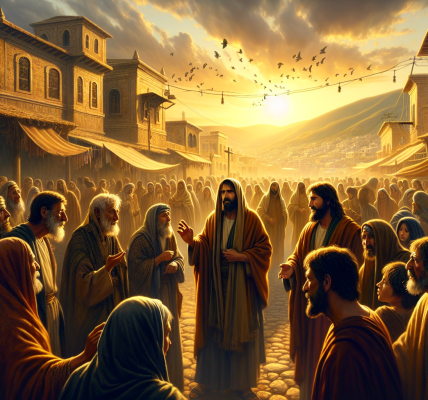**The King’s Sacred Charge: A Story of David’s Preparation for the Temple**
The golden light of the setting sun stretched across Jerusalem, casting long shadows over the stone courtyards of the king’s palace. King David, now an aged man with silver threading through his beard, stood upon the balcony overlooking the city he loved. His heart was heavy yet filled with purpose. For years, he had longed to build a house for the Lord—a magnificent temple where the Ark of the Covenant would dwell forever. But the Lord had spoken clearly: *”You have shed much blood and have waged great wars. You shall not build a house to my name.”* (1 Chronicles 22:8). The task would fall to his son, Solomon, a man of peace.
With a deep breath, David turned and strode back into his chambers, his robes whispering against the polished floors. He clapped his hands, summoning his stewards. “Bring me the records of our treasuries,” he commanded. “And call the chief craftsmen, the masons, the smiths—all who are skilled in the work of building.”
### **The Gathering of Materials**
Over the following weeks, the kingdom buzzed with activity. David sent envoys to the far reaches of his dominion, securing vast quantities of cedar from Tyre and Sidon, where the towering trees were felled and floated down the coast. He summoned quarriers to hew great stones from the earth, each one shaped and smoothed for the temple’s foundation.
But more than stone and wood, David amassed gold, silver, and bronze beyond measure. From the spoils of his victories—the treasures of the Philistines, the Amalekites, and the kingdoms he had subdued—he dedicated everything to the Lord’s house. In the palace storerooms, chests overflowed with golden talents, while stacks of silver ingots gleamed in the lamplight.
One evening, as the king inspected the stockpiles, his advisor Jehiel remarked, “My lord, no king in all the earth has ever prepared such wealth for a single purpose.”
David smiled faintly, his calloused fingers brushing over a bar of refined gold. “This is not for my glory, but for the Lord’s. The temple must be splendid, for it will bear the name of the God of Israel.”
### **The Charge to Solomon**
When the preparations were well underway, David summoned his son Solomon to the throne room. The young prince, though still in the bloom of youth, carried himself with a quiet wisdom that had already marked him as favored by God.
“My son,” David began, his voice thick with emotion, “it was in my heart to build a house for the name of the Lord my God. But the word of the Lord came to me, saying, *‘You have shed much blood before me; you shall not build this house. Behold, a son shall be born to you who shall be a man of rest. I will give him rest from all his enemies. His name shall be Solomon, and I will give peace and quiet to Israel in his days. He shall build a house for my name.’*”
Solomon listened intently as his father continued. “Now, my son, may the Lord be with you, so that you may succeed in building the house of the Lord your God, as He has spoken concerning you. Only may the Lord grant you discretion and understanding, that when He gives you charge over Israel, you may keep the law of the Lord.”
David then placed in Solomon’s hands the detailed plans—scrolls upon scrolls—containing the designs for the temple, its courts, its chambers, and the golden vessels within. “All this,” David said, “the Lord made me understand in writing by His hand upon me—the pattern of all that is to be done.”
### **The Final Blessing**
With the weight of the task now formally passed to his son, David turned to the leaders of Israel, who had gathered to witness the moment. “Now, my lords and people,” he declared, “help Solomon my son, for the Lord has chosen him to build His sanctuary. Be strong and courageous, and do the work. Do not be afraid, for the Lord God, my God, is with you. He will not leave you nor forsake you until all the work is finished.”
The assembly bowed their heads in reverence as David prayed over them, invoking the Lord’s blessing upon the great endeavor. That night, as the torches flickered in the palace halls, David lay upon his bed, his heart at peace. Though he would not see the temple rise with his own eyes, he knew his labor had not been in vain. The Lord had used him to lay the foundation—not just of stone and gold, but of faith and obedience.
And so, with the promise of God’s covenant resting upon Solomon, the stage was set for the building of the greatest sanctuary Israel had ever known—a dwelling place for the Almighty, prepared by a father’s devotion and a son’s faithfulness.




